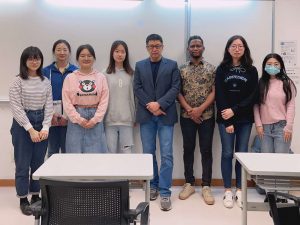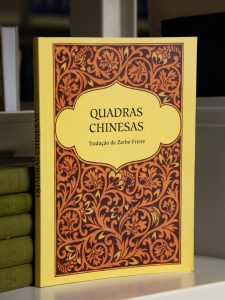What connection could possibly exist between Zerbo Freire, a cool-looking student from Cape Verde, and Wang Wei, a celebrated poet of the Tang dynasty known for his poems about Chinese landscapes and gardens? Zerbo, also a poet and a dedicated translator of both Chinese and Portuguese poems, is currently pursuing a master’s degree in translation studies at the University of Macau (UM). With over 100 Tang poetry translations under his belt, he says: ‘The poems written by Wang Wei have a way of calming my inner turmoil. Through reading Tang poems, I have discovered my passion for studying Chinese.’
Honing Chinese-Portuguese Translation Skills at UM
Zerbo Freire is actually a pseudonym. Zerbo’s real name is Rivaldo Mendes Freire Tavares and he comes from Cape Verde, an island country located in the Atlantic Ocean off the west coast of Africa. Like Macao, Cape Verde was once ruled by Portugal and its official language is Portuguese.
Growing up in a large family of 14, Zerbo faced many challenges during childhood, including poverty and a high crime rate in his community. Determined to break free from this turmoil and explore the world, he studied tirelessly to excel in secondary school, which earned him a place to study economics at a local university. However, his plan to change his life did not work out; because of the high tuition fees, he had to drop out of university after only one year.
Fortunately, it did not take long for Zerbo to start again. He received a scholarship and began his studies in Macao in 2017. At that time, he did not speak any Mandarin, Cantonese, or English. ‘I came with a simple desire to see the outside world, but never imagined it would open the door for me to explore Chinese language and culture, especially Chinese-Portuguese translation,’ he says.
After completing his undergraduate studies in 2021, Zerbo decided to apply for the Master of Arts in Translation Studies programme at UM, as he wanted to remain in Macao to hone his skills in Chinese-Portuguese translation. ‘During my stay in Macao, I fell in love with the campus environment of UM and the Portuguese language atmosphere here. I also want to study Chinese culture and history through the comprehensive education system at UM,’ he explains.
In addition to translation, Zerbo loves poetry and his poems are bold and unbridled. However, when it comes to Tang dynasty poets, he particularly admires the landscape poet Wang. ‘I worked on a report on Wang’s poems last semester,’ he says. ‘Guided by my professor, I conducted extensive research and gained a profound understanding of how Wang used poetry to convey feelings of solitude and nobility.’
During our interview, Zerbo singled out Wang’s ‘The Bamboo Hut’ as his favourite poem. The poem reads, ‘In bamboo grove all alone, I play my qin with a spirited tone. Unknown in the forest deep, the moon my only company to keep.’ He explains, ‘These four lines encapsulate the poet’s idyllic life of serenely playing the qin and singing under the moon alone. The poem reflects Wang’s tranquil and unhurried state of mind. I can be a bit impatient at times, and Wang’s poetry can often calm my heart.’
From a Passion to a Profession
For Zerbo, mastering the Chinese language and its intricacies, including the concepts of stroke order and radicals, is a challenge. This is a common feeling shared by many individuals with little exposure to East Asian culture, and Zerbo candidly acknowledges the difficulty in mastering the language. ‘However, after discovering the beauty of Tang poetry, I found a good reason to learn Chinese and this passion has remained with me ever since,’ he says.
Zerbo warms up gradually to others and may seem cool at first glance, but he is always eager to discuss topics related to Tang poetry. In addition to translating Chinese poems, he also writes his own poems in Portuguese. Much of his work in his poetry collection Visão, Direcção, Acção (Vision, Direction, Action) revolves around Cape Verde, his beloved nation. One of the poems, titled ‘Meu Bairro’ (My neighbourhood), reads, ‘Acorda bairro meu! Vamos modificar esse enredo, Vamos refazer o que está feito.’ (Wake up, my neighbourhood! Let’s change the storyline. Let’s redo what has been done.)
In addition to writing and studying Tang poetry, Zerbo wants to introduce Portuguese-speaking people to this Chinese art form. ‘This idea came to me in 2021, and as far as I know, there are very few translators of Tang poetry in Cape Verde. I see this as a unique opportunity for me and believe that I may be the first Cape Verdean to take on the task of translating Tang poetry,’ says Zerbo.
After over a year of hard work, Zerbo has translated an array of Tang poems and has sought feedback and advice from Chinese and Portuguese translation experts in Macao, including Prof Yao Jingming in the UM Department of Portuguese. ‘I met Prof Yao at an event on Chinese culture before my enrolment at UM and expressed my desire to translate Tang poetry. He also found it a challenge, but said that with determination and hard work, I would be able to accomplish my goal,’ he says.
As a UM student, Zerbo took the opportunity to attend Prof Yao’s course in literary translation. Moreover, he submitted his translation works to Prof Yao, who is also an accomplished poet and translator, and received praise from the professor. ‘Prof Yao took the time to read my work and gave me valuable advice. He encourages me to continue to hone my translation skills,’ he says. ‘In the annotated section of the poem “Home-Coming”, I originally translated the word “hometown” as ”cidade natal”. However, Prof Yao suggested using “terra natal” instead. He explained that while “cidade natal” connotes birthplace, “terra natal” is a more accurate representation of the meaning of “hometown”.’
Learning Chinese History for a Deeper Understanding of Tang Poetry
Having translated over 100 Tang poems, Zerbo admits that he enjoys the translation process very much. ‘Although I face many difficulties in the process, I always feel a great sense of achievement after overcoming them and finishing pieces of work that I am happy with,’ says Zerbo.
One particularly challenging translation task for Zerbo was ‘The Stone Fortress’, a poem written by the famous Tang poet Du Fu. To understand the poem, one must have a deep understanding of historical events and complicated relationships between different states and characters in the Three Kingdoms period. One must also know the history of the decline of the Tang dynasty after the An Lushan Rebellion. ‘This poem by Du Fu is based on the accomplishments and failures of Zhuge Liang (a Chinese statesman and military strategist in the Three Kingdoms period). It is impossible to understand what Du Fu wanted to express without knowing the historical background,’ he says. When translating the title, Zerbo realised that ‘The Stone Fortress’ was a tactical formation developed by Zhuge Liang to train his army, and that the term has no Portuguese equivalent. After careful consideration, he decided to translate ‘The Stone Fortress’ as ‘Labirinto óctuplo’. In Portuguese, ‘labirinto’ means labyrinth and ‘óctuplo’ means eightfold. He used the complex and multifaceted nature of the labyrinth to embody the abstract concept of the way Zhuge Liang trained his army.
‘For Tang poetry, there are strict rules governing the permissible tone patterns and rhyme schemes to make the poems more recitable. While there is no tone pattern in Portuguese poetry, Portuguese poets also use different types of rhymes in their work,’ says Zerbo. As a fan of rap music, he has even incorporated rap skills into his translations of Tang poetry. To improve his translation skills, Zerbo often reads Tang poems translated by Portuguese translator António Graça de Abreu to observe the handling of semantically complex vocabulary in poems. When encountering difficulties in translation, he delves into history books or documentaries to gain a deeper understanding of the time and social context in which the poems were written, in order to accurately embody the emotions of the poets.
Zerbo’s talent for translation is thriving at UM. His book Quadras Chinesas, a collection of 76 translated Chinese quatrains, was published in March 2022 with the support of the Chinese-Portuguese Bilingual Teaching and Training Centre of UM. ‘I am very grateful to the professors at UM for their support and encouragement. It is a great honour to have my work recognised and published by UM,’ he says.
Bringing Tang Poetry to a Wider Audience through Translation
During our interview, Zerbo repeatedly stressed the importance of hard work, which is in line with his motto ‘to grind an iron rod into a needle’, a common Chinese saying. ‘This phrase means that where there is a will, there is a way, which is particularly apt for me as a Chinese learner. With sustained dedication, I believe I will one day become an excellent translator,’ says Zerbo.
In addition to Tang poetry, Zerbo also translates poems from the Song dynasty. He has recently embarked on another project to translate his first Portuguese poetry book, Visão, Direcção, Acção, into Chinese. Through these efforts, Zerbo hopes to tell his personal story, as well as show the beauty of Tang poetry and the richness of traditional Chinese culture, to a wider audience.
English / Debby Seng & UM Reporter Amber Gu
Photo / Debby Seng, Senior UM Reporter Connie Ren, with some provided by the interviewee
Source: My UM ISSUE 121

Zerbo Freire on the UM campus

Zerbo Freire (3rd from right), Prof Yao Jingming (4th from right), and students

Zerbo Freire (centre) shares his translation experience at the launch of his book Quadras Chinesas with Prof Yao Jingming (left) and Hoje Macau Director Carlos Morais José (right)

Zerbo Freire’s first Chinese-Portuguese translation work Quadras Chinesas was published with the support of the Chinese-Portuguese Bilingual Teaching and Training Centre of UM.

Zerbo Freire’s first Portuguese poetry collection Visão, Direcção, Acção
